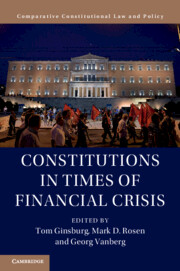Book contents
- Constitutions in Times of Financial Crisis
- Constitutions in Times of Financial Crisis
- Copyright page
- Contents
- Contributors
- Foreword
- I The Role of Constitutions in Dealing with Crises
- II Courts and Crises
- 6 The Place of Economic Crisis in American Constitutional Law
- 7 Financial Crises and Constitutional Compromise
- 8 Commitment for Cowards
- 9 Protecting Fundamental Rights During Financial Crisis
- III Supranational Governance and Crisis
- IV Implementing Austerity
- V The Effect of Crises on Constitutions
- Index
8 - Commitment for Cowards
Why the Judicialization of Austerity Is Bad Policy and Even Worse Politics
from II - Courts and Crises
Published online by Cambridge University Press: 08 June 2019
- Constitutions in Times of Financial Crisis
- Constitutions in Times of Financial Crisis
- Copyright page
- Contents
- Contributors
- Foreword
- I The Role of Constitutions in Dealing with Crises
- II Courts and Crises
- 6 The Place of Economic Crisis in American Constitutional Law
- 7 Financial Crises and Constitutional Compromise
- 8 Commitment for Cowards
- 9 Protecting Fundamental Rights During Financial Crisis
- III Supranational Governance and Crisis
- IV Implementing Austerity
- V The Effect of Crises on Constitutions
- Index
Summary
In response to the eurozone crisis, EU leaders turned to the courts for help. At an intense moment in the crisis in 2012, they abandoned the eurozone governance rules that had been established when the common currency, the euro, was created. Among other things, the original Maastricht Treaty rules had required eurozone states to maintain fiscal discipline and had prohibited EU institutions or other member governments from providing bailouts to member states that might become insolvent. But when push came to shove, EU leaders largely threw those rules out of the window and provided bailouts to the states that needed them, beginning with Greece. With the Maastricht regime in tatters, leaders designed a new governance regime that sought to judicialize austerity, calling on national courts to enforce the fiscal rules in a way that the politicians themselves had refused to do.
Information
- Type
- Chapter
- Information
- Constitutions in Times of Financial Crisis , pp. 146 - 162Publisher: Cambridge University PressPrint publication year: 2019
